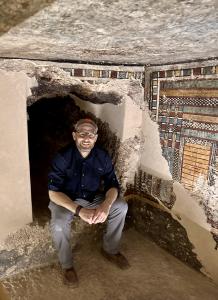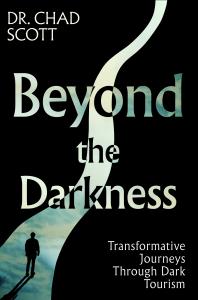
Dark Tourism as Therapy: Dr. Chad Scott Explores the Power of Travel in Beyond the Darkness
A therapist and travel writer explores dark tourism sites worldwide, revealing how journeys through tragedy can inspire healing, strength, and meaning.
But this isn’t just about places—it’s about what those places reveal within us. With the insight of a therapist and the heart of a survivor, Scott uncovers how sites marked by tragedy can teach resilience, deepen empathy, and inspire healing. For anyone navigating grief, loss, or personal challenges, this book offers a new way to travel—one that not only connects us with history but also transforms how we see ourselves.
This Q&A explores the story behind the book: why it was written, how trauma shaped the author’s path, and how dark tourism invites us to grow through reflection, not fear.
Q: Your book explores some of the darkest places on Earth—former battlefields, prisons, cemeteries. What draws you to these spaces most people try to avoid?
A: I've always been drawn to historical sites, but over time, my focus shifted to darker ones—graveyards, battlefields, places marked by suffering. What pulls me in is the depth. These places offer a window into resilience and the hardships people faced. Visiting them doesn’t leave me feeling hopeless—it inspires me. It makes me want to live more fully, love more deeply, and not waste a second.
Q: You mentioned this journey started not long after your liver transplant. Can you talk about how the book came to be?
A: After I left the hospital, I had this sudden surge of energy I hadn’t felt in years. Despite the physical pain, I needed to channel my energy, so I started traveling. On my second day on a trip to Los Angeles, I was already at my second cemetery, exploring celebrity graves. That’s when it hit me—these places weren’t just fascinating; they were empowering as I reflected on the successes and struggles of the celebrities buried there. They gave me insight and strength as I recovered.
That energy became the driving force behind the book. I’d always felt I had another book inside me, and this one pulled together my love of history, travel, and psychology. As a therapist, I could explore the emotional weight of these places in a way most travel writers can’t. I wanted to show how they can transform us—not just haunt us.
Q: Your book combines travel, history, and your perspective as a therapist. How did your background in mental health influence the way you approached these destinations?
A: I work with clients who’ve experienced many different forms of trauma, and I’ve always felt a responsibility to understand their pain. That same mindset guides me when I visit places of historical trauma. I try to mentally and emotionally walk beside the people who suffered there.
In the book, I act as a kind of therapist-tour guide. I don’t just explain what happened—I help unpack what it means. The power is in the empathy and the reflection we bring to these experiences.
Q: You’ve described your book as part travel memoir, part self-help. That’s an unusual mix. How do you balance storytelling with personal growth without sounding preachy?
A: I’ve gained so much from researching and visiting these places. That personal element was essential—it helps readers connect, not just with the history, but with the emotional experience.
I’ve gone through serious illness, divorce, struggles with alcohol, and a liver transplant. Dark tourism gave me perspective and strength when I needed it most. It would’ve felt dishonest not to include that.
So I weave my story throughout—not to compare my pain to historical suffering, but to show how those places echoed back into my own life. With my background as a therapist, it naturally took on a self-help tone without trying too hard.
Q: You had Dr. Philip Stone—arguably the leading voice in dark tourism—write the foreword. What does that mean to you, and how did that come about?
A: Funny enough, I first emailed Dr. Stone just to introduce myself but didn’t hear back. Then out of the blue, he reached out—he’d read the concise edition of my book and appreciated the idea. We built a connection, and I eventually asked if he’d consider writing a blurb.
When he agreed to do the foreword, I was beyond excited. He’s shaped the academic foundation of dark tourism. His books, like 111 Dark Places in England That You Shouldn’t Miss, and his upcoming Scotland book, are essential reads. For someone like me—a former academic—it meant everything to have a respected scholar offer his voice instead of a celebrity quote with no real connection to the content.
Q: If there’s one thing you hope readers take away from your book, what would it be?
A: I want people to understand that dark tourism isn’t solely about sensationalism. If you approach these places with the right mindset—one of reflection and honoring victims—you start to see yourself in their stories.
That connection can change you. It helps you understand your own fears, struggles, and strength. Ironically, facing the darkest chapters of human history can make us better at living.
For me, it helped me face a life-threatening illness with almost no anxiety—something I had previously struggled with significantly. That’s what I hope readers take away: these journeys aren’t just about history, they’re about growth and healing. We need to go to these places not only to learn, but to feel. That’s what stays with us and rises to the surface when we need it most. It’s something few typical self-help books can achieve—lasting change.
—Beyond the Darkness, published by Whitefox Publishing of London, is available now for pre-order and will be available everywhere books are sold on May 1st, with the audiobook edition slated for release in June.
Eli Porter
Unbound Travels
email us here
Visit us on social media:
Facebook
Distribution channels: Book Publishing Industry, Culture, Society & Lifestyle, Healthcare & Pharmaceuticals Industry, Travel & Tourism Industry, World & Regional
Legal Disclaimer:
EIN Presswire provides this news content "as is" without warranty of any kind. We do not accept any responsibility or liability for the accuracy, content, images, videos, licenses, completeness, legality, or reliability of the information contained in this article. If you have any complaints or copyright issues related to this article, kindly contact the author above.
Submit your press release


